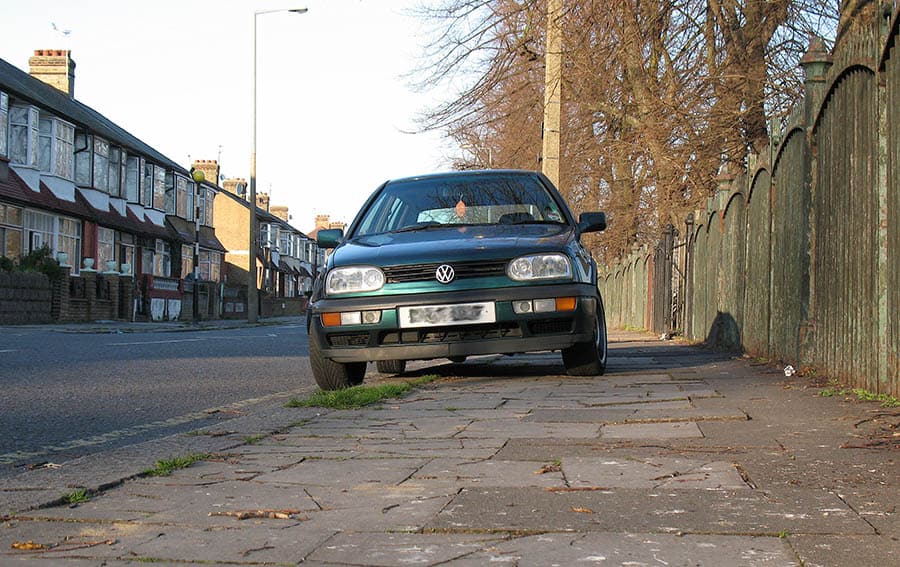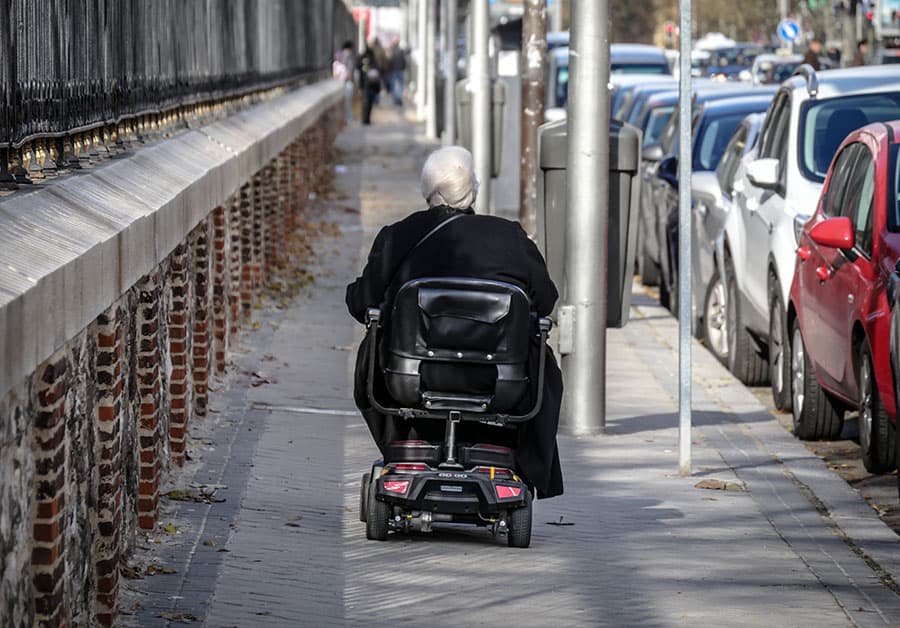DEEP DIVE: Pavement parking predicament: Is it time for a nationwide ban?

For those using mobility aids such as wheelchairs or scooters, pavement parking has often been a common issue affecting people’s safety.
Blocked pavements force people to travel on potentially dangerous roads to navigate obtrusive obstacles and in November 2019, a scooter rider from Grimsby suffered a significant accident after being forced to leave a footpath.
In a move praised by groups campaigning to make pavements safer for elderly and those with mobility needs, Scotland has passed a bill to outlaw pavement parking and consultation is taking place in England to do the same, however, it is a topic that is proving controversial and dividing opinions.
Scotland makes history
Passed on the 10th October 2019 and coming into effect in 2021 as part of the Transport (Scotland) Bill, the new law sees Scotland become the first country in the UK to place a nationwide ban on pavement parking.
Campaigning since August 2011 for a change to parking legislation, the landmark decision has been hailed by Living Streets Scotland, the Scottish arm of the UK-wide charity for everyday walking.
“People in wheelchairs, parents with pushchairs and older adults who are currently forced into oncoming traffic when faced with vehicles blocking their path will now be able to enjoy a new freedom.” Stuart Hay
Calling pavement parking a “pain for everyone”, Living Streets has stressed that it is particularly an issue for those with mobility problems and older people, making it extremely difficult for wheelchair and scooter users to navigate the blocked streets.
In addition, the charity emphasised that pavement parking causes tens of thousands of pounds of damage to pavements each year, incurring significant costs on strained local authorities.
“This is the first nationwide ban put in place in the UK and represents the culmination of over a decade of campaigning by Living Streets Scotland and disability charities,” commented Stuart Hay, Director of Living Streets Scotland, after the bill was passed in 2019.
“People in wheelchairs, parents with pushchairs and older adults who are currently forced into oncoming traffic when faced with vehicles blocking their path will now be able to enjoy a new freedom. It also stands to offer huge savings to cash-strapped councils currently charged with fixing footways damaged by vehicles parking on them.”
In Scotland’s new bill, police, ambulance, fire & rescue vehicles will be exempt from the new ban, as well as vehicles used for postal services and medical practitioners, such as nurses and midwives, who are administering emergency health care.
Additionally, the bill says the ban will not apply to those who pull over on a pavement “for the purpose of saving a life” or reacting to an emergency, accident or breakdown.
Controversially, the bill also contains a contentious clause that allows for delivery vehicles to park on the pavement for up to 20 minutes at a time, which Living Streets has claimed will undermine the purpose of the law, leaving it open to abuse and threatening local authorities’ ability to enforce it.
“The government should now ensure that supporting guidance and regulations on this exception makes enforcement a simple and practical matter. Parking for loading must be simple to regulate or enforce if councils are to engage with the problem,” continued Stuart.
“We will work with the Scottish Government as it finalises its guidance, and with local authorities, disability groups and communities to ensure the ban is implemented effectively.”

Is England planning to follow suit?
Following the decision to introduce the blanket ban in Scotland, Living Streets called on England and Wales to adopt a similar stance and legislate to ban pavement parking.
“Pavement parking is the one issue we are contacted most about at Living Streets, with older adults especially reporting that they’re unable to leave their homes because of vehicles blocking their pavements and leaving no room for mobility aids,” stated Joe Irvin, Chief Executive for Living Streets in 2019.
“The Scottish Government has demonstrated a commitment to accessibility for all by passing this law. England and Wales should not delay in following Scotland’s lead.
“It’s high time that everyone can use our streets safely and enjoy the benefits that come from being active, outside and connected to their local community.”
The call echoed the recommendations made by England’s Transport Committee in September 2019 following a review of the detrimental effect pavement parking has on people with disabilities and the elderly.
In particular, the Committee found that pavement parking for people with mobility or visual impairments could result in people feeling unable to safely leave their homes, increasing social isolation and loneliness.
“Pavement parking has a huge impact on people’s lives and their ability to get around their communities,” commented Lilian Greenwood MP, the Chair of the Transport Committee in September 2019.
“Motorists may feel they have no choice but to park on the pavement and many try to do so in a considerate way, but evidence to our inquiry revealed the impact on those with visual and mobility impairments and people with children.
“We are deeply concerned that the government has failed to act on this issue, despite long-standing promises to do so. This is a thorny problem that may be difficult to resolve to the satisfaction of all, but the government’s inaction has left communities blighted by unsightly and obstructive pavement parking and individuals afraid or unable to leave their homes or safely navigate the streets.”
Pavement parking was outlawed in London in 1974, however, the ban does not extend to the whole of the country, with local authorities being required to establish prohibited pavement parking zones.
“In the long-term we believe the government should ban pavement parking across England—as is already the case in London,” she continued.
“Local authorities could create exemptions if they choose to do so, but drivers would know that unless it was expressly permitted it was illegal to park their car on the pavement.”
“We recognise that implementing a nationwide ban will take time. In the short-term we have said that the government should make it easier for local authorities to put in place parking restrictions by removing some of the bureaucratic burdens they currently have to contend with.”

Government on notice
In response to the growing pressure of campaigning groups and the Transport Committee, the government in England confirmed in February 2020 that it will run a consultation about a potential national ban on pavement parking.
The Department for Transport will examine consider several measures relating to pavement parking before reaching a decision, including enhancing police and local council powers to enforce a ban.
“Councils are already struggling to implement low emission zones, cycling and walking policies, active travel policies, 20mph zones and a host for other transport measures” Neil Greig
Importantly, however, no date has been specified for when the consultation will report and with the recent coronavirus outbreak, it is not likely to be high in the agenda for some time.
Commenting on the government’s intention to address the problem of pavement parking, the Chair of the Transport Committee, Huw Merriman MP, said: “The government promised to look into the issue in 2015 but consultations, roundtable events and internal reviews failed to lead to any actions to improve the experience of the public. This government has signalled an intent to finally deliver change. We now need a detailed timeframe from the Department for Transport to ensure this happens.
“In publishing today’s Response, we are putting the Government on notice that we will be monitoring progress carefully. We look forward to reviewing progress on each of the pledges and our Committee has committed to a further evidence session in 12 months’ time to drive real change.”
A growing appetite in Wales
It is not just in England where pavement parking is gaining attention, with the Welsh Government recently announcing it has set up a task force to address pavement parking.
It comes as research from 2019 by Living Streets Cymru suggests that 83 percent of people in Wales want to see an end to pavement parking, as well as stating that 88 percent of local authorities in Wales have received letters from members of the public complaining about pavement parking.
“England and Wales should not delay in following Scotland’s lead.” Joe Irvin
According to the campaign group, the survey, which questioned over 1,000 people, highlighted a desire for a pavement parking ban in Wales, with the country’s Deputy Minister for Transport Lee Waters AM supporting the campaign.
Commenting in the report’s foreword, he said: “The Living Streets Cymru report highlights the real blight for communities caused by pavement parking. Cars that block pavements stop many people, especially those with mobility and sight impairments, from leaving the house because they feel that it is too dangerous to navigate the streets.
“Welsh Government is looking at ways to address this problem as part of our wider response to the climate emergency, the air quality crisis and the obesity epidemic.”
Relocation, relocation, relocation
Heralded as the right move by disability campaigning groups, some organisations have warned that a blanket ban, such as the one introduced in Scotland, will lead to problems for residents parking, as well as additional costs for councils which will be required to make more parking available for motorists.
The charity IAM RoadSmart, the UK’s biggest independent road safety charity, warned in June 2019 that a blanket ban on pavement parking could lead to a need for thousands of new car parking spaces that towns and cities are simply not equipped to provide.
Submitting its thoughts regarding the problem of pavement parking to England’s Transport Committee, IAM RoadSmart’s Director of Policy and Research Neil Greig noted that, with increasing numbers of cars on the road, local councils lack the funding or the road capacity to provide the extra spaces people need to park.
“New traffic orders, new signposting, new road markings and new enforcement administration will all be required at extra cost if a blanket ban is introduced,” he said.
“Councils are already struggling to implement low emission zones, cycling and walking policies, active travel policies, 20mph zones and a host for other transport measures against a background of budget cuts and dwindling resources.”
For residents living in narrow streets in Scotland, the ban could also prove to be problematic, with some warning of potential damage to parked cars and difficulty for vehicles, particularly emergency vehicles, to navigate tight residential roads at night.
With valid arguments both for and against the introduction of a blanket pavement parking ban to be rolled out across the UK, it is certain governments in both England and Wales will be watching Scotland closely to see what implementation and enforcement problems arise once the ban comes into force.
As more pressure continues to be applied to England’s and Wales’ governments from vocal campaigning groups, alongside growing concerns for mobility scooter safety, it may just be a matter of time, however, before England and Wales follow Scotland’s example.


